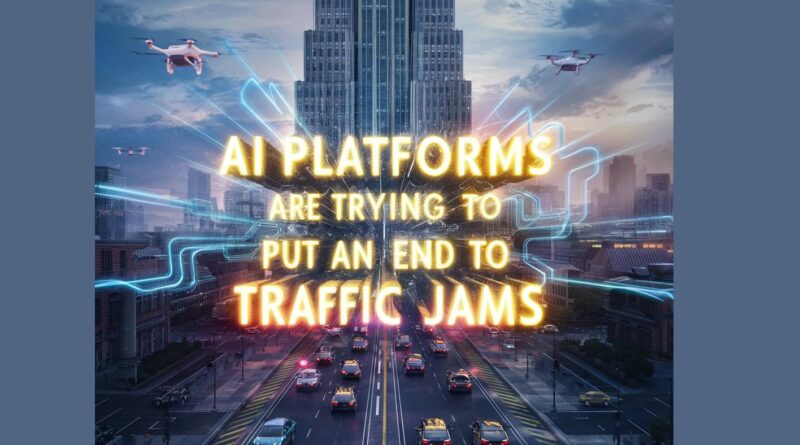AI platforms are trying to put an end to traffic jams
For ordinary people, driving through a number of green traffic lights is often a matter of a few lucky strikes AI platforms. But in a few years, it could assist in making such a scenario far more realistic. Cities around the world are now experimenting with new platforms which are capable of processing data gathered from the cars themselves and from navigation applications to enable ‘green waves’ and thus constant and smooth traffic flow.
The initiatives have been largely successful: Some examples of its work include an Alphabet project referred to as Green Light, which has led to a 30% reduction in congestion, as cited in the Wall Street Journal.
It’s being used in 16 cities of the world today and some of them are Abu Dhabi city and Seattle city and Hamburg city and many more. Green Light is currently used for about 30 million car drives per months and is scheduled to expand to other towns in the near future.
AI data platforms
It seems that AI platforms are attempting to bring traffic jams to an end in this great race that we can observe between cars.
This congestion is apparent in most cities across the globe and is caused by many factors. They create delays, frustrations, and can be a lot more than that in some cases. However, what would life be like if there was a solution to traffic congestion or even their complete eradication?
That is where AI platforms come into play or rather step up to offer their services. They are using the best technology and algorithms to solve the problem of traffic as the driving arena is striving for better management and enhancement.
The main issue involved in traffic jams
Traffic congestion arises out of mismatch between the flow of vehicles and the flow carrying capacity of the roads. This is caused mostly by issues like traffic accidents, roadwork, or just congestion where too many cars attempt to traverse the same pathways AI platforms.
This obviously leads to slow or even crippled traffic flow whereby vehicles may be stationary for some time causing a lot of congestion and annoyance to the motorists.
How AI is maintaining Road traffic systems
AI, or artificial intelligence, is the replication of the cognitive functions of the human intellect by using computers. AI platforms describes traffic management systems, as these systems are capable of analyzing significant traffic data without delay.
This involves information that is given by traffic cameras, sensors, and GPS gadgets. Such information helps the AI make assessments regarding the zones with high traffic density and adapt traffic lights to better manage the congestion.
Smart Traffic Signals
Another smart approach that AI platforms is utilising in reducing traffic congestion is through application of smart traffic signals. These signals employ historic and current information to control the period of the traffic signals in regard to the traffic density.
For instance, when a specific road has many cars, the signal will remain green for an extended period, permitting more traffic flow. This minimizes instances where there would be long queues, and the flow of traffic is well maintained.
Predictive Traffic Modeling
It is also through the use of predictive traffic modeling that AI is handling traffic in some ways. This involves using past data to predict the expected traffic flow and then manipulating traffic lights to enhance the expectation. For instance, if there is big event around that specific region, AI knows that there will be a lot of traffic hence it can well plan to avoid jams.
Real-Time Route Planning
AI is also being used greatly in traffic in terms of offering timely traffic analysis and route advice. With the help of components such as GPS and traffic information, it is possible for the AI systems to propose the best way to the drivers to follow. It not only avoids traffic congestion but also, saves travelling time, and fuel utilization for independent drivers.
Self-Driving Cars
Soon, autonomous vehicles will become critical in handling traffic and, thereby, the overall traffic flow. These cars are worked through the AI technology to arrange and even communicate with other cars resulting in smooth traffic.
Some of the implications of self-driving cars include lights and signs on the road may cease to be relevant since the cars will have a way of relating to each other in terms of speed limits and direction likely to be taken.
They are the The Advantages of AI in Traffic Control.
Reduced traffic congestion
Shorter travel times
Better quality of air since emissions from cars that are congested on the roads taking long time to cover a particular distance will now be reduced.
Reduced number of casualties on the roads
Reduced fuel consumption and associated expenditure on the side of the driver
Challenges and Limitations
However, there are still some issues and barriers that make traffic improvement by the use of AI difficult though it remains to be a promising technology. These include:
Cost: Using AI in the administration of cities or governments may prove expensive, and here are some of the reasons.
Data privacy: The employment of real-time data is disadvantageous as it involves infringement of person’s privacy and protection of their data.
Infrastructure: In order for AI to successfully operate in traffic, certain requirements must be met among which we have traffic cameras and sensors.
Maintenance: AI systems are just like any other complex entities that need to be run, maintained, and updated from time to time.
Prospect of application of artificial intelligence in traffic controlling
Hence, the future seems bright in the application of AI in traffic management despite these difficulties. Needless to say, with the advent of newer forms of technology in the sphere and with people investing in more self-driving cars, AI could reshape how traffic flow is handled.
The use of AI is essential as cities expand, and roads become more filled with cars which affects the lives of so many by causing traffic disruptions.
Top ai cloud business management platform tools
Discover top AI cloud business management platform tools designed to streamline operations, boost efficiency, and enhance decision-making. These AI-driven platforms offer solutions for project management, financial tracking, CRM, and workflow automation, helping businesses of all sizes optimize performance. With cloud-based accessibility, they provide scalable tools to support growth, data analytics, and team collaboration, making business management smarter and more efficient.
ai data platform
The conversational AI platform has emerged as a revolutionary tool in addressing urban traffic congestion. Leveraging advanced data analytics and real-time processing capabilities, these platforms provide city planners and commuters with actionable insights and efficient solutions to mitigate traffic jams.
Innovations in Traffic Management
Conversational AI platforms utilize machine learning algorithms to predict traffic patterns and offer dynamic route planning. Integrating with Google Cloud AI Platform, these solutions can process vast amounts of data from various sources, including GPS signals, traffic cameras, and social media updates, to provide accurate traffic forecasts.
Impact on Commuters
For daily commuters, conversational AI platforms offer personalized route recommendations and real-time traffic updates. These AI platforms for business applications also enhance ride-sharing services by optimizing routes to minimize travel time and fuel consumption, thereby reducing overall traffic volume.
Benefits for Urban Planning
City planners leverage AI platforms for business analytics to design smarter infrastructure
Enhanced Emergency Response
During emergencies, conversational AI platforms can significantly improve response times. By providing real-time traffic data to emergency services, these platforms facilitate quicker and more efficient navigation through congested areas, potentially saving lives.
The Current State of Traffic Jams: A Global Overview
Traffic congestion is a significant issue affecting urban areas worldwide. Cities from New York to Tokyo face daily gridlock, resulting in lost time, increased pollution, and economic costs. Despite various efforts to alleviate traffic, traditional methods have often fallen short due to the constantly evolving nature of urban mobility.
Conversational AI Platform: Revolutionizing Traffic Management
Conversational AI platforms are emerging as groundbreaking tools in the battle against traffic jams. These advanced platforms leverage artificial intelligence to offer real-time traffic information, suggest optimal routes, and even predict congestion patterns. By integrating conversational AI platforms with existing traffic management systems, cities can create more responsive and adaptive infrastructures.
Google Cloud AI Platform’s Role
Google Cloud AI Platform is at the forefront of developing solutions to combat traffic congestion. Utilizing vast amounts of data, Google Cloud AI Platform enables the analysis and prediction of traffic patterns. This data-driven approach helps in formulating strategies to divert traffic during peak hours, thereby reducing overall congestion.
Impact on Businesses and Commuters
AI platforms for business, including conversational AI platforms, are transforming how companies manage logistics and employee commutes For daily commuters, AI-powered traffic solutions mean shorter travel times and less stress, significantly improving quality of life.
Future Innovations and Expectations
The future holds exciting potential for AI in traffic management. Conversational AI platforms will continue to evolve, incorporating more sophisticated algorithms and real-time data integration. As these technologies advance, we can expect even more precise traffic predictions and innovative solutions, further alleviating the burden of traffic congestion globally.
Conversational AI platforms are revolutionizing how we tackle traffic congestion in urban areas. By leveraging advanced algorithms and the extensive data processing capabilities of AI, cities can predict traffic patterns and implement proactive measures to ease traffic flow.
AI-Powered Traffic Management Systems
Conversational AI platforms are at the forefront of traffic management innovation. These systems analyze real-time data from various sources, such as GPS devices, traffic cameras, and social media feeds. The Google Cloud AI Platform, for instance, offers scalable solutions that allow cities to integrate multiple data streams. By doing so, AI-based traffic management systems can optimize traffic light sequences, re-route vehicles, and provide drivers with up-to-date information on the best routes to take.
Smart Traffic Signals
Another groundbreaking application is the development of smart traffic signals. Leveraging conversational AI platforms, these signals adjust their timing based on real-time traffic conditions. This dynamic approach significantly reduces idle times at intersections and minimizes stop-and-go traffic, leading to smoother and more efficient traffic flow. AI platforms for business, such as those offered by Google Cloud AI, enable municipalities to deploy and manage these smart systems effectively.
Predictive Traffic Analytics
AI-powered predictive analytics play a crucial role in addressing traffic congestion. By analyzing historical traffic data alongside current conditions, conversational AI platforms can forecast traffic patterns and identify potential bottlenecks before they occur. With these insights, city planners can implement strategic measures, such as adjusting public transportation schedules or deploying road maintenance crews during off-peak hours.
Impact on Commuters
The application of conversational AI platforms in traffic management not only benefits city infrastructure but also directly impacts commuters. Reduced travel times, fewer delays, and more reliable public transportation options enhance the overall commuting experience. Businesses utilizing AI platforms for their logistics and delivery operations also see increased efficiency and cost savings. In conclusion, conversational AI platforms are transforming how we address traffic jams in modern transportation systems. The integration of AI-powered solutions, like those provided by Google Cloud AI Platform and other AI platforms for business, leads to smarter, more efficient urban traffic management. This revolution is making our cities not only more navigable but also more livable.
How Conversational AI Platforms Can Improve Traffic Management
Conversational AI platforms are revolutionizing traffic management by providing real-time data, predictive analytics, and enhanced communication systems. Leveraging technologies like Google Cloud AI Platform, these solutions offer a dynamic approach to alleviating traffic congestion and improving overall road safety.




